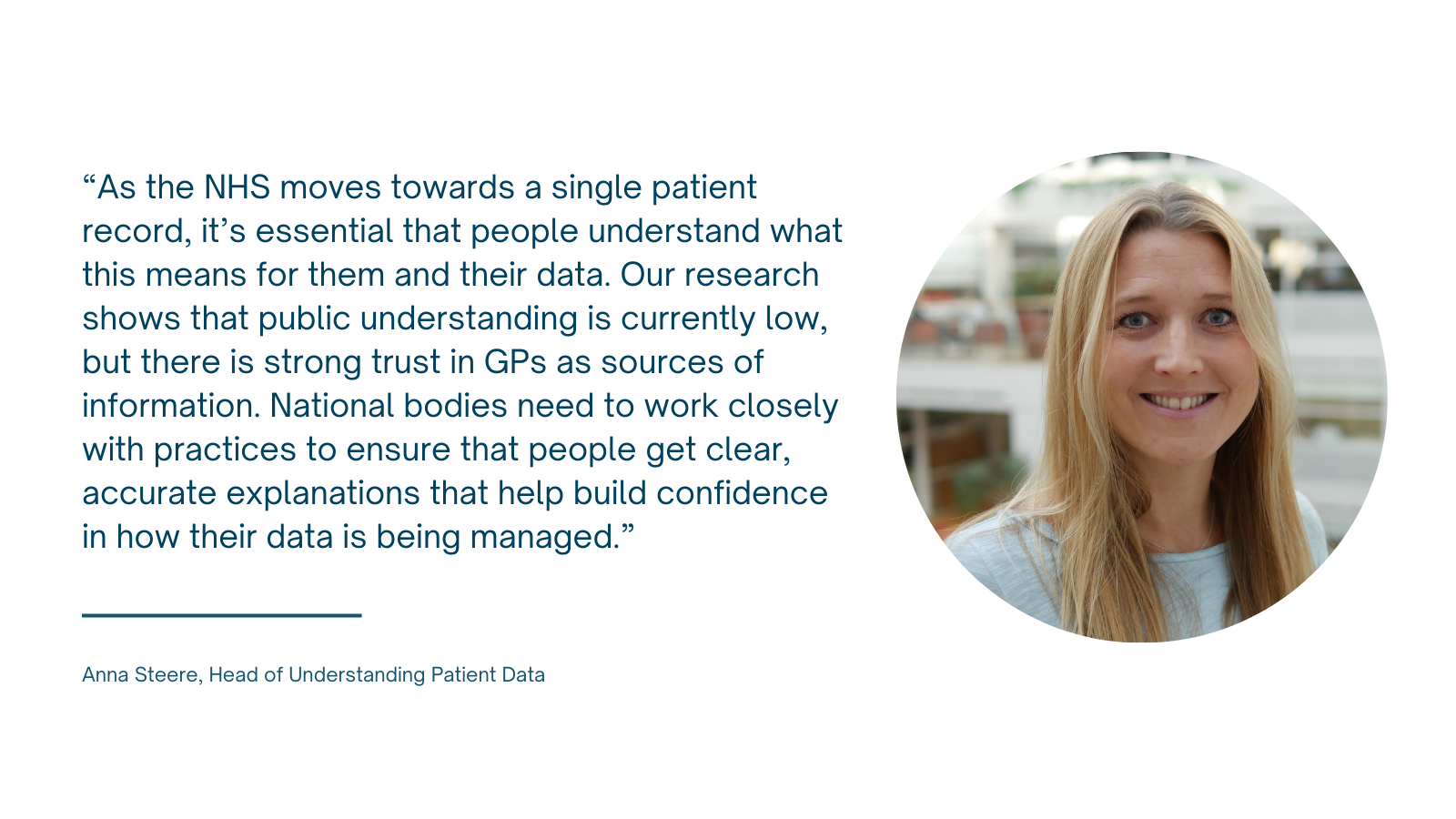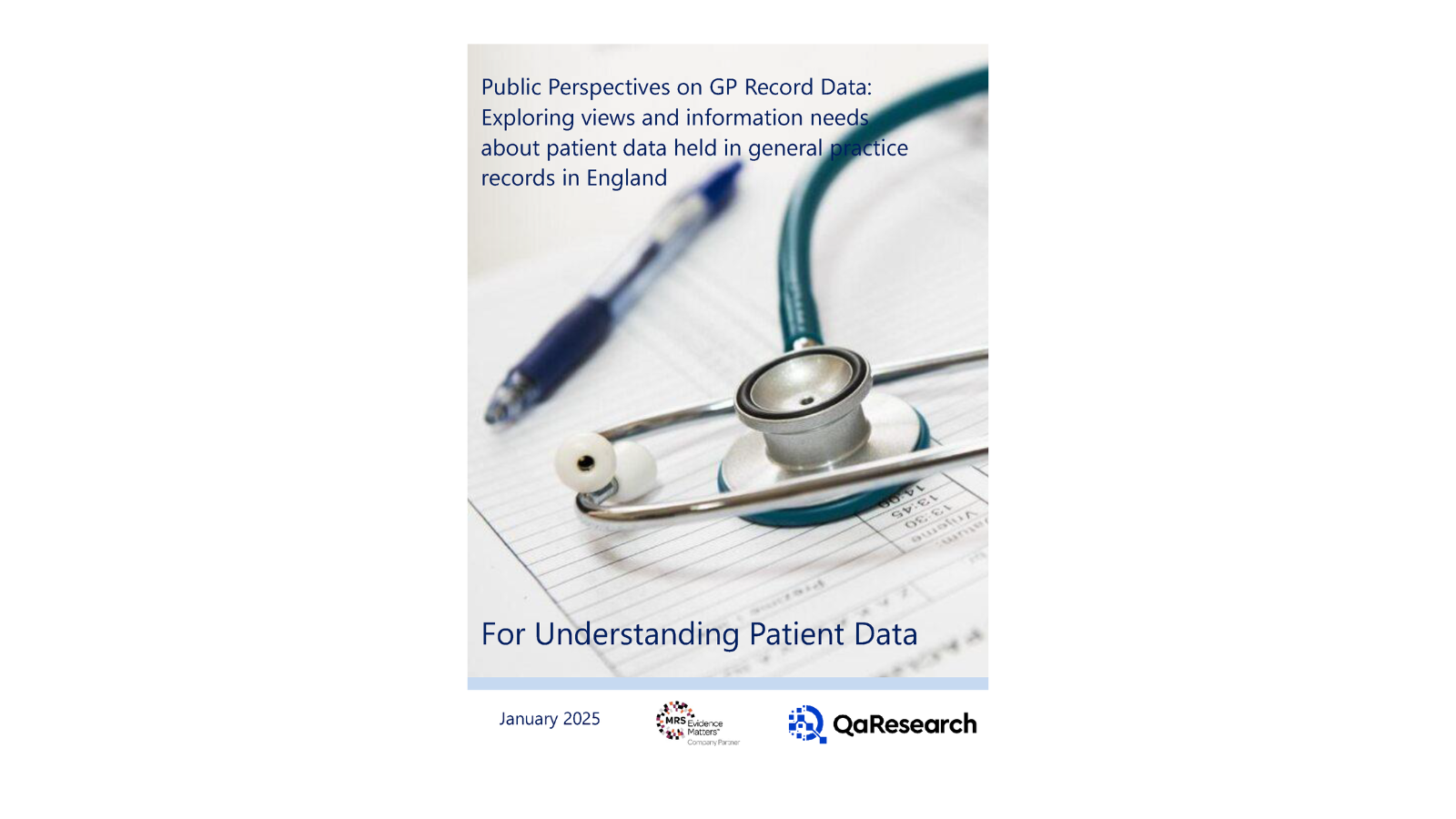Background
The data held in a person’s GP (general practitioner) patient record, in comparison with a person’s hospital or other health records, is often considered the most extensive source of information about a person's health and is very useful for both individual patient care and secondary purposes - such as planning and research.
In recent years, attempts by NHS England to bring GP data together to support planning and research have been abandoned after being met with pushback from privacy campaigners, parts of the medical profession and some members of the public. High-profile initiatives that have failed to win support include care.data and the General Practice Data for Planning and Research (GPDPR) programme.
Research shows that GP surgeries are generally more trusted by the public than other organisations to manage data. However, there is limited evidence exploring this issue in more detail, aside from work focused on evaluating specific initiatives or programmes (e.g. GPDPR). It is also sometimes posited that people view GP record data differently than data from other sources, but this has not been explored extensively in the literature.
Given ongoing debates about data controllership for GP record data, and plans to roll out a single patient record across the NHS in England, it is important to understand what people think about the data in their GP record. Our research explores this and seeks to understand the information needs among members of the public to support effective communicate of any changes in a way that is accessible, transparent and meets public needs.
About the research
We commissioned Qa Research, a research agency, to carry out this work. They captured the views of members of the public across England through a three-part research project. Phase one consisted of a nationally representative (England) online survey of 1,004 people. Phase two consisted of six semi-structured focus groups and 5 telephone interviews. Phase three consisted of three co-design workshops and 3 in-person interviews.
Surveys are useful because the size of the sample is likely to generate insights that are representative of the general UK population, whereas focus groups and workshops generate more in-depth insights into individuals’ views and add nuance. It is important to note that whilst we recruited a diverse sample for the workshops, the sample size for the workshops is too small to be statistically significant or representative. There are also some groups within the survey sample which were too small to make statistically significant observations.
Our research explored:
- Awareness of the information held in GP records and how they are stored
- Awareness of how to access one’s GP record, and experience accessing GP records
- Awareness and views about the use of GP record data, including who can access the data, different use cases for GP record data, decision-making about GP record data, and support for sharing data from the GP record
- Views on how GP record data differs from other health records
- Information preferences and needs including what topics related to GP record data people would like to find out more about, level of involvement in decision making and preferences regarding source, method and format
Key findings
- Current awareness and understanding of how NHS records are managed is low. 61% of people surveyed already believe a single national patient record exists, and 57% do not recall receiving information about the data held in their GP record.
In workshops, we found that participants tended to perceive the NHS as a single organisation. This may help to explain why people expect the NHS to hold a single national healthcare record about them.
- Mixed views on decision-making suggest the need for clear communication about how data is managed.
Given a binary choice, 61% of people stated they would prefer a nationally-controlled single patient record over a GP record managed by GP surgeries. At the same time, GPs were perceived as the most trusted to make decisions about patient data. This apparent contradiction – higher trust in GPs but a preference for a nationally controlled record – highlights the importance of clear communication to align public expectations with practice.
- 78% would prefer information about their GP record to come from GPs, highlighting the importance of supporting practices in delivering consistent messaging.
When prompted, this was reported to be based on personal relationships with patients and high levels of trust in GPs generally. However, many workshop participants also expressed the view that that national health bodies would be better situated to provide uniform, accurate information due to their resources and reach, when compared to individual GP surgeries.
- People value transparency about GP data, but think information about to their own record is the most important.
81% of people think it is ‘very’ or ‘somewhat’ important to be able to see their own GP record, but only 56% said they had seen their record. Most wanted information about the topic to be minimal and focused on key topics that were considered personally relevant, with more information available on request:
In particular, people were interested in:
- How to find and see the GP record
- Who has access to data from their GP record, what level of information they have access to and why
- Choices around opting out of their data being used and shared
- How GP record data is kept safe and secure
Participants were generally less interested in what information is collected and held in the GP record and how GP record data is used for individual care as they felt they broadly knew about these topics already.
Implications for policymaking
1. Aligning public expectations and understanding
While many assume a national patient record already exists, there is limited understanding of the management of health records. The apparent contradiction – higher trust in GPs but preference for nationally controlled single patient records – highlights the need for clear communication on upcoming changes and decision-making processes.
2. Supporting GPs as trusted messengers
As members of the public would expect to look to GPs for information about this topic and would prefer information to come from GPs, any changes to the way GP data is used or managed should involve national organisations supporting and empowering GPs to ensure they are equipped to explain these to patients. National organisations will need to support practices in delivering clear, consistent messaging.
3. Targeted and transparent communication
Messaging should be concise and focus on what matters most to people—how to access records, who can see their data, and how it is protected. Particular attention is needed for seldom-heard and minoritised communities, who may have greater concerns about data sensitivity and may need tailored materials. Transparency is key: while most prefer brief, accessible information, detailed resources should be clearly signposted for those seeking more depth.

Download the research
- Access the full report
- Survey findings and research materials (including survey results with tables and graphs, and research materials such as the workshop discussion guide and stimulus materials)
If you are interested in seeing the full data tables from the surveys in .xls format, please contact us.
Next steps
UPD will be sharing the findings from this research widely with people working on policy and communications related to GP record data. We will also be sharing it with healthcare organisations, members of the wider data community, and other policy stakeholders such as patient advocacy groups and think tanks.
We are currently exploring how we can take the findings of the report forward to support GP surgeries, other healthcare providers and Government with resources to help communicate effectively with members of the public about the data held in their records.
If you have any questions about the report, or would like to discuss this topic further with us, please email us at hello@understandingpatientdata.org.uk.

